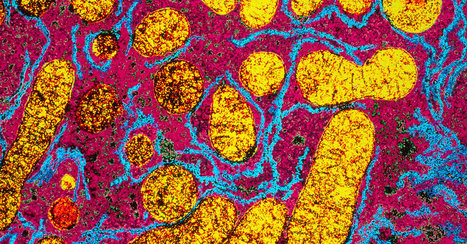For a long time, biologists thought our DNA resided only in the control center of our cells, the nucleus.
Then, in 1963, a couple at Stockholm University discovered DNA outside the nucleus. Looking through an electron microscope, Margit and Sylvan Nass noticed DNA fibers in structures called mitochondria, the energy centers of our cells.
Our mitochondrial DNA accounts for a small portion of our total DNA. It contains just 37 of the 20,000 to 25,000 protein-coding genes in our body. But it is notably distinct from DNA in the nucleus. Unlike nuclear DNA, which comes from both parents, mitochondrial DNA comes only from the mother.
Nobody fully understands why or how fathers’ mitochondrial DNA gets wiped from cells. An international team of scientists recently studied mitochondria in the sperm of a roundworm called C. elegans to find answers.
Their results, published this week in the journal Science, show that paternal mitochondria in this type of roundworm have an internal self-destruct mechanism that gets activated when a sperm fuses with an egg. Delaying this mechanism, the scientists found, led to lower rates of embryo survival. Down the road, this information could help scientists better understand certain diseases and possibly improve in vitro fertilization techniques.
This work “comes closest to elucidating a key development process that has perplexed us for a long time,” said Justin St. John, a professor at the Hudson Institute of Medical Research in Australia, who was not involved in the research.
It’s well known that the transfer of mitochondrial DNA from mother to offspring, often called maternal inheritance, occurs in humans and most multicellular organisms. Maternal inheritance is what allows genetic testing services like 23andMe to trace our maternal ancestries. You inherited your mitochondrial DNA from your mother, who inherited hers from her mother and so forth.
Maternal inheritance also gave rise to the idea that there exists a “Mitochondrial Eve,” a woman from whom all living humans inherited their mitochondrial DNA.
BIG BANG NEWS
RESEARCH, TECHNOLOGY, SCIENCE, DIACHRONIC NEWS, COMMENTS, ,SPORTS,MUSIC,SKY AND STARS,AND MUSH MORE.
Αναζήτηση αυτού του ιστολογίου
Παρασκευή 24 Ιουνίου 2016
Why Do We Inherit Mitochondrial DNA Only From Our Mothers?
Εγγραφή σε:
Σχόλια ανάρτησης (Atom)

Δεν υπάρχουν σχόλια:
Δημοσίευση σχολίου
NO COMMENTS!